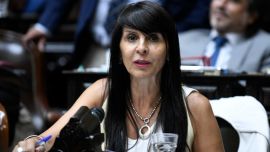False friends and fake news underly the main themes in the New England academic Dr Hale’s email this week. He writes:
“The Spanish language not being my forte (I’d be consulting a far more professional economist than you if it were), your word ‘tarifas’ has always confused me – it immediately starts me thinking about tariffs and protectionism when I’ve come to learn that it refers to the pricing of public services. What linguists call ‘false friends.’ Anyway in last week’s email I was somewhat carried away by the ‘tarifazo’ as the main issue (and still very much the big noise this week) but now I’m a bit sceptical. I have my personal definitions of fake news – whereas I find it hard to believe that anything said about Donald Trump could be fake news, that category in my view extends not only to downright lies but also to many of the main headlines hiding the real story. The 30-40 percent increase in gas bills has been turned into the culprit for nagging inflation but I’m not so sure after coming across some figures on core inflation (excluding both regulated prices and seasonal factors) – this now tops a monthly two percent when a year ago it was more like 1.7 percent while the annual projection from the first quarter of this year is 27 percent as against 22 percent from the first quarter of 2017.
“Two weeks ago I was asking you about the strange sight of Argentina importing soy from the United States and now my question would be when it is going to start importing wheat. The bakeries might complain about their utility bills but I see that the price of flour has risen over 50 percent so far this year and wheat 67 percent in the last five months – might not the drought be turning agriculture into a weaker link in the chain and could economics be returning to the days of Marie Antoinette when bread prices were at the forefront? But I prefer slightly more sophisticated theories – I remember that in that email of a fortnight ago asking about the soy imports your reply concluded by saying that inflation was multi-causal and that we should also listen to the monetarists.”
My reply:
“While I continue to think that the role of monetary policy in inflation has been generally underestimated, it does not explain everything either. Interpretations of the dollar might or might not need a complete rewind after the Central Bank’s record sales of US$1.47 billion on Wednesday, one-third of the total intervention so far this year taking reserves below US$ 60 billion – hard to say right now whether this was a freak combination of circumstances or if it marks a new monetary trend. There was a monetary policy of inflation targeting for five quarters but it died at the end of last year when the targets were revised with highly visible political interference. A new monetary policy will not enjoy credibility until the image of Central Bank Independence is restored and this will not be easy.
“But the problems extend beyond the monetary sphere and the inability of demand to keep up with money supply – the balance of payments is leaking all over the show. The government might boast a successful fiscal policy in reducing the fiscal deficit by an annual one percent of gross domestic product, with every prospect of staying on target this year (always primary deficit, of course, with debt service mounting by at least as much in a world of tightening credit), but the total balance of payments arrears of over US$30 billion are almost five percent of GDP. And the question is not so much where are the holes as where are they not. The fiscal deficit’s terrible twin is trade, which was some US$8.5 billion in the red last year due to stagnant exports and a 20 percent surge in imports. But the tourism deficit is nearly as bad at over US$7 billion, which also leads to the alarming conclusion that much of all that money being borrowed abroad (with the balance of financial services being almost twice as adverse as trade at over US$15 billion) is going toward feeding that deficit by financing the shopping trips to Chile or Miami rather than bridging the fiscal gap or updating infrastructure (the latter the only real basis for repaying debt). Nor will holding down the dollar as an anchor against inflation help to reverse this trend.
“This downward slide was relieved this week by the announcement of the first export pick-up in 14 months in the March figures although trade was still over US$600 million in the red for the month. Yet this was far less our pick-up than Brazil’s. Almost all the 17 percent growth came from car sales because the auto pact with the giant Mercosur partner basically works that way with supply in one country depending on demand in the other – with three straight years of recession in Brazil and Argentine growth almost trebling Brazilian last year, the neighbour’s capacity to sell cars here previously outweighed its market to buy them but with Brazilian growth very possibly outstripping Argentine this year thanks to the drought, this imbalance is perhaps already being corrected with far less Brazilian cars being purchased here. But the sum of all these deficits from chronically living beyond the country’s means crowds out productive capital, preventing virtually every sector from being competitive. President Mauricio Macri was at the Vaca Muerta shale fracking site on Monday to flag that huge opportunity while hopes are pinned on areas like mining and tourism but as things now stand, agriculture might well remain the strongest link in the chain despite everything.
“Finally, let’s not omit the week’s main issue altogether. Since we last communicated, the taxation of public services has emerged as a factor in the cost equation (this was negligible during the long freeze – when rates were at the level of my four-peso train ride to La Plata last January, how much tax was that going to yield?). Now Macri is using Buenos Aires Governor María Eugenia Vidal’s initiative in waiving provincial taxation (less than 0.5 percent of her 650-billion-peso budget) to pressure her colleagues to emulate her, thus placing the ball in their court – some governors have already asked Macri to share the sacrifice by scrapping 21 percent IVA value-added taxation while there was a fiery Congress session on Wednesday. A new tussle is underway and I’ll let you know how it plays out if you’re interested.”





















Comments